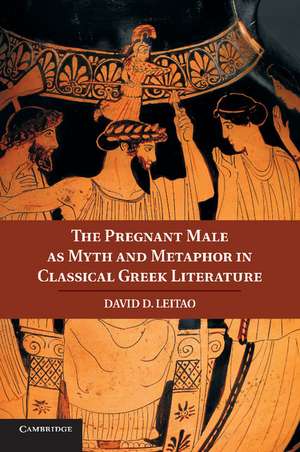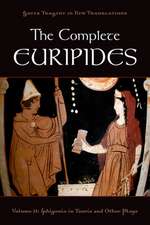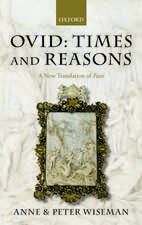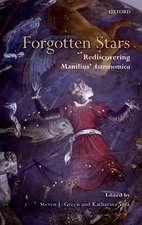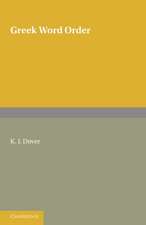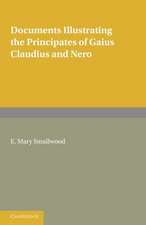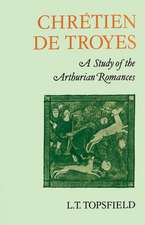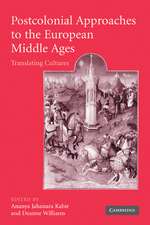The Pregnant Male as Myth and Metaphor in Classical Greek Literature
Autor David D. Leitaoen Limba Engleză Paperback – 9 iul 2014
| Toate formatele și edițiile | Preț | Express |
|---|---|---|
| Paperback (1) | 382.71 lei 6-8 săpt. | |
| Cambridge University Press – 9 iul 2014 | 382.71 lei 6-8 săpt. | |
| Hardback (1) | 696.80 lei 6-8 săpt. | |
| Cambridge University Press – 29 apr 2012 | 696.80 lei 6-8 săpt. |
Preț: 382.71 lei
Nou
Puncte Express: 574
Preț estimativ în valută:
73.23€ • 76.65$ • 60.95£
73.23€ • 76.65$ • 60.95£
Carte tipărită la comandă
Livrare economică 31 martie-14 aprilie
Preluare comenzi: 021 569.72.76
Specificații
ISBN-13: 9781107423497
ISBN-10: 110742349X
Pagini: 320
Dimensiuni: 152 x 229 x 18 mm
Greutate: 0.47 kg
Editura: Cambridge University Press
Colecția Cambridge University Press
Locul publicării:New York, United States
ISBN-10: 110742349X
Pagini: 320
Dimensiuni: 152 x 229 x 18 mm
Greutate: 0.47 kg
Editura: Cambridge University Press
Colecția Cambridge University Press
Locul publicării:New York, United States
Cuprins
1. Introduction; 2. The new father of Anaxagoras: the one-seed theory of reproduction and its reception in Athenian tragedy; 3. The thigh birth of Dionysus: exploring legitimacy in the classical city-state; 4. From myth to metaphor: intellectual and poetic generation in the age of the Sophists; 5. Blepyrus' turd-child and the birth of Athena; 6. The pregnant philosopher: masculine and feminine procreative styles in Plato's Symposium; 7. Reading Plato's midwife: Socrates and intellectual paternity in the Theaetetus; Appendix 1. Did any thinker before Democritus argue for the existence of female 'seed'?; Appendix 2. Women and men as grammatical subjects of τίκτω.
Recenzii
'This important and thought-provoking book provides a meticulously documented history of the metaphor of male pregnancy in Athens during the classical period … Leitao successfully demonstrates that the conception of intellectual production as a male reproductive act did not spring from Plato's head fully formed. Rather, it is the culmination of a long history of Greek thinkers' use of male pregnancy to think through intellectual problems. With its detailed account of the genealogy and evolution of the pregnant male metaphor, this book fills an important gap in the study of intellectual history … [it] tracks the metaphor's development in well-known authors, such as Aristophanes, Herodotus, Plato, and the tragedians, but also in less frequently discussed works … makes a valuable contribution to scholarly discussions of gender and reproduction by introducing less frequently discussed texts into the conversation …' Bryn Mawr Classical Review
'[A] brilliantly executed volume … With a secure command of the primary sources and all relevant scholarly commentary, Leitao convincingly elaborates his analytical program. Adducing an impressive array of evidence [the author] charts the evolutionary development (during the period 470–350 BCE) of this potent image (with its multiple variations, interpretations, and purposes of employment over a period of time). A resonant intellectual and literary conceit, the notion of the pregnant male, at its core, asserted an elemental connection of paternal pregnancy/parturition to the modalities of 'authorship (i.e., 'giving birth') and creativity with respect to ideas, thought, epistemology, art, laws, and institutions. Leitao's introduction is particularly useful for its linear outline of his purpose, program, and methodology; his bibliography and appendixes attest to the breadth and integrity of his scholarship. Summing up: highly recommended. Upper-division undergraduates through faculty.' J. S. Louzonis, Choice
'[A] brilliantly executed volume … With a secure command of the primary sources and all relevant scholarly commentary, Leitao convincingly elaborates his analytical program. Adducing an impressive array of evidence [the author] charts the evolutionary development (during the period 470–350 BCE) of this potent image (with its multiple variations, interpretations, and purposes of employment over a period of time). A resonant intellectual and literary conceit, the notion of the pregnant male, at its core, asserted an elemental connection of paternal pregnancy/parturition to the modalities of 'authorship (i.e., 'giving birth') and creativity with respect to ideas, thought, epistemology, art, laws, and institutions. Leitao's introduction is particularly useful for its linear outline of his purpose, program, and methodology; his bibliography and appendixes attest to the breadth and integrity of his scholarship. Summing up: highly recommended. Upper-division undergraduates through faculty.' J. S. Louzonis, Choice
Notă biografică
Descriere
This book traces the image of the pregnant male in Greek literature as it evolved during the classical period.
